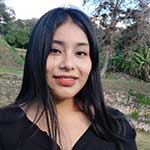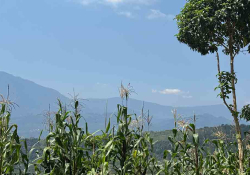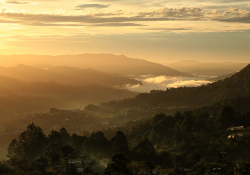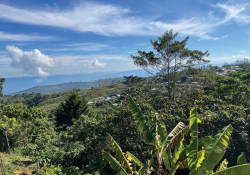Error message
A Conversation with Ch’ol Poet Juana Peñate Montejo
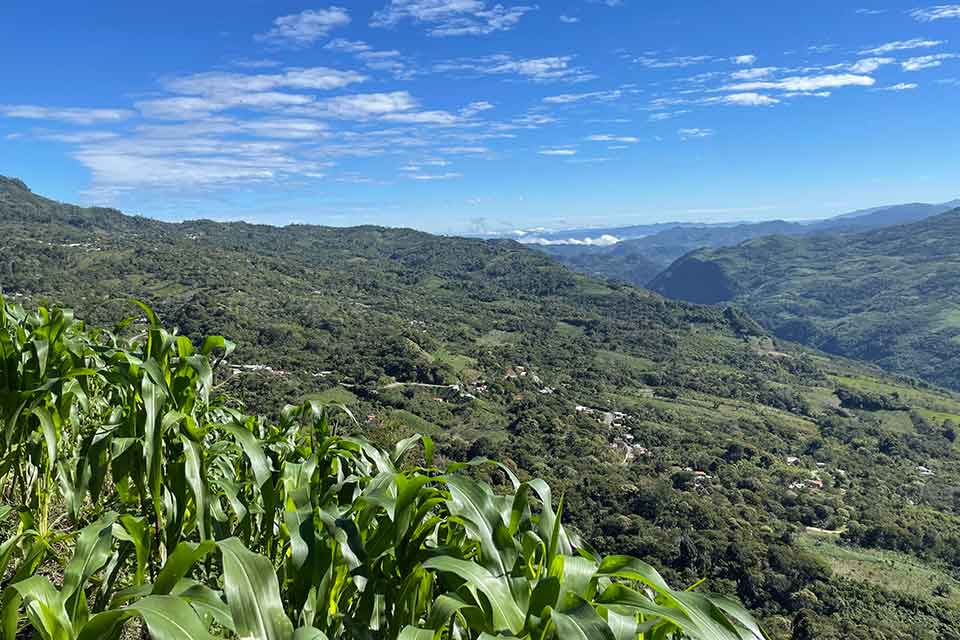
The following interview was conducted in Ch’ol at the poet’s house in Tumbalá, Mexico, on January 7, 2022. Little and Friedman’s translations of three of Peñate’s poems appear here in the March 2022 issue, where you can hear the author read the Ch’ol and Spanish versions of the poems. Their translators’ note also appears in the issue.
Carol Rose Little: Juana, it’s good to see you again and to be here in Chiapas.
Juana Peñate Montejo: Thank you for coming back to Tumbalá; I am happy to have you in my home again.
Little: I am curious—you grew up in Tumbalá, then you went to live in other places. What motivated you to return?
Peñate: Why did I come back? I thought about it a lot. I felt I had a debt to my mother, because she didn’t know how to read, she didn’t go to school. I remember her saying to me: “I don't speak Spanish, and we [the Ch’ol people] have only our language. So much has been taken from us.” I returned here to teach young people. That’s why I came back, and I have been here for almost twenty years now.
Little: Tell us about the work you do here.
Peñate: I currently work as the director of Tumbalá’s Casa de la Cultura where we teach young generations how to read and write in their language as well as teach them traditional dances, embroidery, and to play instruments like the marimba.
Little: From what I’ve seen, you are teaching them so well! Do people here still speak Ch’ol?
Peñate: Yes, the young generation is using the language. There are mothers and fathers who are teaching their children, though we are seeing it being lost. When kids grow up they no longer want to speak it—when they go to university, for example. Then they return and are ashamed to speak our language. They don't want to drink pozol or our coffee anymore or eat beans. Sometimes, parents say that our language has no value. I try to help young people see its importance and strength. I always tell them that this language is not mine but our ancestors’. Even though they were oppressed, they preserved the culture and the language.
I always tell them that this language is not mine but our ancestors’. Even though they were oppressed, they preserved the culture and the language.
Little: Tell us about how you began writing poems, when you were a girl.
Peñate: As a child I always read poems, but they weren’t in Ch’ol. They were written in Spanish. I found them in books given to us by the secretary of education, and I started to write my own poems for the school where I was studying. In fifth grade, I wrote a poem called “Woman” in Spanish. I wish I had kept my first writings!
Little: Are there other poets who write in Ch’ol, and do you all get together regularly?
Peñate: What you are asking is very important. All of us who write poetry are scattered throughout Chiapas in Palenque, in Yajalón, Tila, Sabanilla, and San Cristóbal. We work by ourselves. We need a place to gather, but we live far from one other. It would be difficult to hold meetings, so we communicate in Spanish on Facebook and WhatsApp.
Little: It would be nice to organize a roundtable with you all—for a reading and a discussion. I want to ask a really simple question: What do you write about?
Some say that we are Indios, and that we don’t feel as they do. But in our hearts, there is sadness and joy. We have secrets; we love, we have souls and hearts.
Peñate: I write what I see happening around me. Everything I write has happened in my land. I write for those who don’t know us or who don’t know our land. I write that I am like the forest, the mountains. In my poems, I am no longer Juana Peñate. I write that I smell like the river, that our perfume smells like a river. The river is beautiful when we catch it in a jícara, when we bathe, the water feels so good when it runs over our skin. I don’t know if people who don’t live here can understand this. Here in Mexico, some say that we are Indios, and that we don’t feel as they do. But in our hearts, there is sadness and joy. We have secrets; we love, we have souls and hearts. But how can I make this understood? Maybe they have changed their minds and opinions.
Little: In your poems you give voice to battered women and to people who have died. Can you talk about this aspect of your work?
Peñate: There is violence against women by their husbands, parents, brothers; there is a lot of violence, and I write about that. There are women who continue to live as before, who have six or seven children, but are mistreated; that’s why I write. Women who do not speak the Ch’ol language have thanked me for my poetry. They say, “Juana, before, I had a lot of problems, but your poetry has helped me to see them more clearly.” If these women are finding my work useful and it is helping them to raise themselves up, that is important. I talk to them about the importance of writing in our language, and that we shouldn’t allow ourselves to be humiliated, just as my mother used to tell me.
Little: In your new collection, Dance of the Rain, there is a very strong group of poems about those who migrate north and those who cross to the United States to look for work. How does this fit into your work—why did you write about it?
Peñate: It has been happening for the last three or four years. Men are returning in coffins, the ones who go in search of work in Sonora, in Playa del Carmen. I try to communicate to young people that if they want to go away, they should prepare first, so that things go better for them. I encourage them to study so that they have legal papers and can move around without any problem.
I see many problems here in Tumbalá. One week, two or three bodies arrived. They were young people—eighteen, twenty, twenty-five years old. Once, the body of a girl who was murdered in the United States arrived. How can I help my people? I don’t have a lot of money, so I started writing about migrants to try and communicate to young students, so that they study and the same thing doesn’t happen to them. I read my poems in schools every time I have the chance.
I haven’t had the need to seek a life elsewhere, but I understand when men and women leave to find better opportunities. I try to make them understand that it is a long, long way to walk, and there will be hunger, exhaustion, and injury. If you manage to get there, you have won, but if not . . .
Little: Yes, this is a serious issue, and it’s a powerful collection of poems. In all your collections, you translate the poems into Spanish, too, which means they reach a broader audience. Is it difficult to translate the Ch’ol into Spanish?
Peñate: Yes, very. Spanish is not my first language. I learned it in school, and even then they didn’t teach us to speak it very well. I’ve learned a lot through translating. Ch’ol is easy because I speak it every day. Now, when I think of a word in Ch’ol, I often think of it simultaneously in Spanish, and vice versa.
Little: Sometimes when you translate a poem, does the meaning change?
Peñate: The poem in Ch’ol is different from the one in Spanish; it is practically two books of poems in one. I imagine that the same thing happens in English, when you translate poems from Ch’ol to English?
The poem in Ch’ol is different from the one in Spanish; it is practically two books of poems in one.
Little: There were words that Charlotte and I chose not to translate into English like chajk and wäy. Would you talk about those and why they’re so difficult to translate?
Peñate: Yes, for example, chajk, the word you mentioned, in Spanish means lightning. But it doesn’t have the same significance in Spanish. In Ch’ol, chajk is like our mother, something huge. Wäy, in Ch’ol, we know as the animal companion that is given to us for our protection. That’s what our grandparents told us. We have a wäy, a protector who always accompanies us, whether small or large, a hen, a bird, or a four-legged animal. Translated into Spanish, it wouldn’t make much sense.
Little: Now you are seeing your work in American literary magazines like World Literature Today, and that’s fantastic. Who do you hope reads your poetry?
Peñate: My poetry is not just for those who speak our language but also for those who don’t. It’s good that it reaches students and teachers in the United States or anywhere in the world where English is spoken. There are many Ch’oles who left Mexico, and maybe they already speak English or Spanish, but when they see the Ch’ol they will say, Ah! It’s from Mexico! When they read the poetry, I hope they feel happiness in their hearts.
Little: Thank you for having me in your home and for the delicious coffee and sharing so much with us.
Peñate: Thank you for visiting me, for coming this far. And thank you for translating my writing into English.
Translation from the Ch’ol and Spanish
Editorial note: Carol Rose Little and Charlotte Friedman worked from a Spanish transcription of the interview to translate the conversation into English. Morelia Vázquez Martínez translated the initial interview from Ch’ol into Spanish.
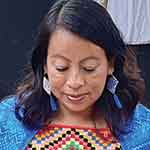 Juana Peñate Montejo is a Ch’ol poet and writer from Tumbalá, Chiapas, Mexico. She has authored several books of poetry in Ch’ol with self-translations in Spanish, including Ipusik’al Matye’lum / Corazón de la Selva (Pluralia) and, most recently, Isoñil Ja’al / Danza de la Lluvia, which won the 2020 Premio de Literaturas Indígenas de América.
Juana Peñate Montejo is a Ch’ol poet and writer from Tumbalá, Chiapas, Mexico. She has authored several books of poetry in Ch’ol with self-translations in Spanish, including Ipusik’al Matye’lum / Corazón de la Selva (Pluralia) and, most recently, Isoñil Ja’al / Danza de la Lluvia, which won the 2020 Premio de Literaturas Indígenas de América.


